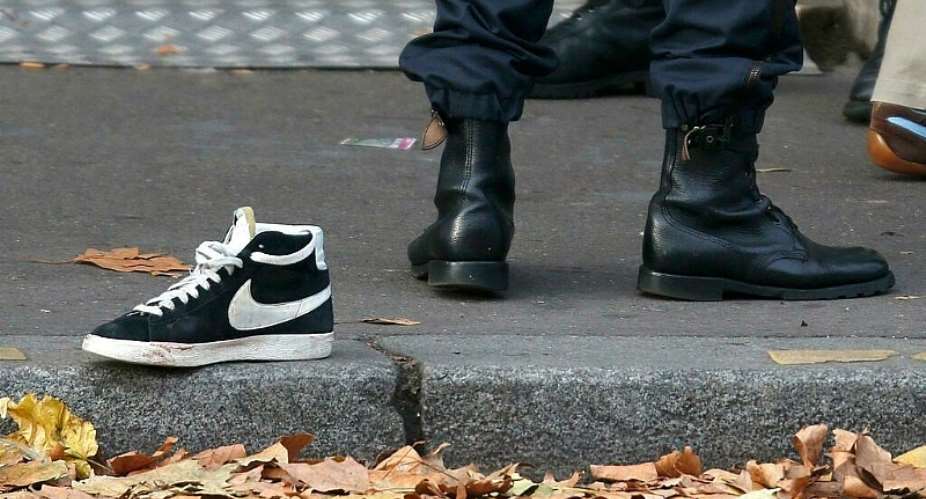Everyone knows about the heroism of the specialised BRI and RAID police units, the men who finally confronted the terrorists and saved the hostages at the Bataclan. But the bravery of the 17 men of the Paris Anti-Criminal Brigade (BAC 75N), who followed their commissioner into the attack, seems to have been forgotten.
Four of the 17 testified on Wednesday.Confusion abounded, they said.
Ordered to deal with a "situation" at the Bataclan, with rumours of explosions and shootings, the members of the unit found themselves sharing out insufficient safety gear.
They were then ordered to form-up and wait in the street, 200 metres from the Bataclan.
Their chief, the commissioner C, who can't be identified for security reasons, sent a message from inside, telling his men that he needed help. "They're killing people. I don't know how many attackers. They're going to kill everyone. You have to come."
There was no further hesitation. The order to remain at a distance was ignored. They went in to help their leader.
The scene inside the main entrance of the Bataclan has already been described too many times.
Crucially, two of the policemen who testified noticed the feet of a child, moving. They dragged him out, alive. Today, he's a healthy 11-year-old.
Feeling helpless
Other victims were less fortunate. The witnesses admited that they ignored appeals for help from badly injured people as they advanced. The need to secure the building, the uncertainty about the number of terrorists, the danger of a massive explosion, obliged them to stay together and keep moving.
The imploring hands and eyes of the injured were ignored. But will not be forgotten.
One woman grabbed a witness by the leg. "She begged me to help her," he told the special criminal court. "I looked her straight in the eyes and I said 'Don't worry, the ambulances are arriving.' And I shook her hand off."
He saw the same woman later. She was dead.
"I don't know what to say to her family. I'm distraught. But at that very moment, there was nothing I could do to help. I'm so sorry."
- Father describes the tragic fate of the 131st victim of the November 2015 massacres
- Bataclan families speak of the impossibility of forgetting, the difficulty of forgiving
Once they were sure the terrorists had retreated, the members of BAC 75N started to help the injured, evacuating those who could be moved.
One witness, a first aid specialist, remembers helping 10 victims, stemming blood loss, packing gaping wounds. Another helped "four or five". All would have wished to do more.
When the medical emergency staff arrived, the men of BAC 75N were redeployed around the concert venue, to make sure the terrorists could not escape. And then they were ordered back to base.
Invisible heroes
These men who can not forget were forgotten. "It was as if we hadn't been there. There was nothing about us in the papers. My wife thought I was making it up."
"We were told to keep quiet about the operation," another testified. "They said we could be proud of what we did. But if we talked about it, we'd be breaching the police obligation of silence.
"They gave us a medal ... silver .... 500 euros each, and a promotion. That was it."
Yesterday's fourth witness was not present. His letter to the court was read by a colleague.
"Not a day goes by when I don't relive the horror of that night," he wrote. "I can't stand crowds. I have become addicted to alcohol. I am angry and aggressive." He has since lost the right to carry a police weapon.
"I am a shadow of the man I was."





 Former Kotoko Player George Asare elected SRC President at PUG Law Faculty
Former Kotoko Player George Asare elected SRC President at PUG Law Faculty
 2024 elections: Consider ‘dumsor’ when casting your votes; NPP deserves less — P...
2024 elections: Consider ‘dumsor’ when casting your votes; NPP deserves less — P...
 You have no grounds to call Mahama incompetent; you’ve failed — Prof. Marfo blas...
You have no grounds to call Mahama incompetent; you’ve failed — Prof. Marfo blas...
 2024 elections: NPP creates better policies for people like us; we’ll vote for B...
2024 elections: NPP creates better policies for people like us; we’ll vote for B...
 Don’t exchange your life for wealth; a sparkle of fire can be your end — Gender ...
Don’t exchange your life for wealth; a sparkle of fire can be your end — Gender ...
 Ghana’s newly installed Poland train reportedly involved in accident while on a ...
Ghana’s newly installed Poland train reportedly involved in accident while on a ...
 Chieftaincy disputes: Government imposes 4pm to 7am curfew on Sampa township
Chieftaincy disputes: Government imposes 4pm to 7am curfew on Sampa township
 Franklin Cudjoe fumes at unaccountable wasteful executive living large at the ex...
Franklin Cudjoe fumes at unaccountable wasteful executive living large at the ex...
 I'll 'stoop too low' for votes; I'm never moved by your propaganda — Oquaye Jnr ...
I'll 'stoop too low' for votes; I'm never moved by your propaganda — Oquaye Jnr ...
 Kumasi Thermal Plant commissioning: I pray God opens the eyes of leaders who don...
Kumasi Thermal Plant commissioning: I pray God opens the eyes of leaders who don...
